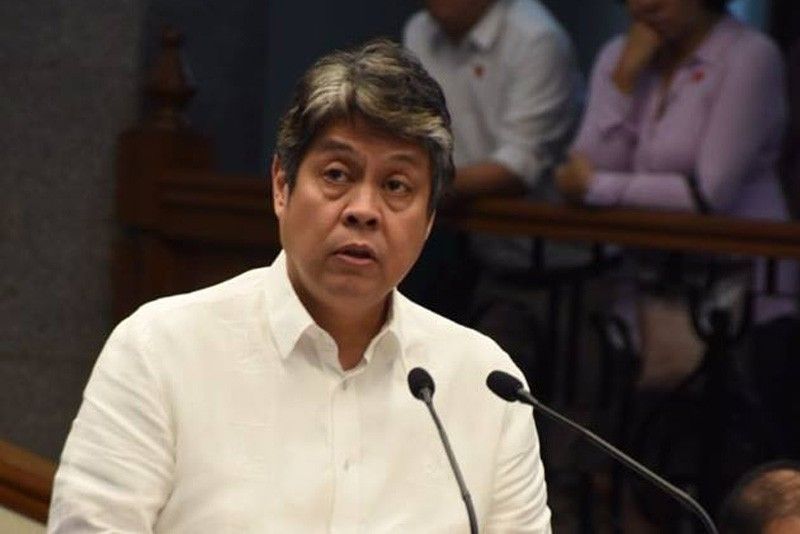Senate set to tackle draft federal charter

MANILA, Philippines — Now in possession of an official copy of the draft federal constitution, the Senate panel tasked to handle proposed charter amendments has set for Tuesday its first discussion on the document.
Sen. Francis Pangilinan, chairman of the committee on constitutional amendments and revision of codes, said the proceedings on Tuesday would also be a continuation of previous hearings on related bills.
He said he hopes to find in the draft charter very specific and concrete proposals on the type of federalism the administration wants.
Pangilinan’s panel received its copy of the draft charter from the consultative committee (Concom) formed by President Duterte to review the 1987 Constitution.
In previous consultations held in Metro Manila, Cebu, Cotabato and Baguio City, Pangilinan said various versions of federalism had been proffered by different organizations and proponents of a federal system of government.
For Tuesday’s hearing, Pangilinan said Concom chairman and former chief justice Reynato Puno has confirmed his attendance, along with former Supreme Court associate justice Adolfo Azcuña and constitutional expert Christian Monsod. Former chief justice Hilario Davide Jr. has also been invited but has yet to confirm his attendance.
Pangilinan said survey outfits Pulse Asia and Social Weather Stations (SWS) have also been invited to share insights on the sentiments of the public on the issue.
A survey released by SWS revealed that only one in four Filipinos were aware of federalism.
Pulse Asia, in its own survey, showed that 66 percent of Filipinos are opposed to a shift in the form of government from unitary to federal.
Pangilinan said this was an indication that the public is not too keen on amending the Constitution, as there are matters more pressing to the people like putting food on the table, finding jobs and increasing their take home pay.
He said the committee would not commit to any timetable for completing the consultations on charter change as there are a number of key questions that must first be resolved before going into the specifics of the proposals.
The question on whether there is a need to amend the Charter to begin with should be answered.
Furthermore, the motives of the proponents of Charter change should also be established, as there are indications the endeavor is intended to extend the term of some elected officials.
Pangilinan said statements coming from the leaders of the House of Representatives about a possible no-election scenario for 2019 have prompted some quarters to question the motive of people behind Charter change.
“The cat is now out of the bag,” said Senate Minority Leader Franklin Drilon in reaction to proposals that the mid-term elections next year be postponed to enable lawmakers to focus on the push for federalism.
He said there are over 80 members of the House who stand to benefit from a postponement of the elections because their terms are expiring next year.
There are also the legislators who are eligible for reelection, and thus would certainly benefit from the postponement of the elections.
Incumbent elected officials whose terms are ending next year and who cannot stay in a holdover capacity if the elections were postponed are likely to be appointed by the President. This, in effect, would be like having extended term for such officials.
He said the Supreme Court has upheld the power of the President to appoint officials when elections are postponed.
Senate Majority Leader Juan Miguel Zubiri called for an end to “no-el” speculations, saying they’re hurting the country by scaring away investors.
“We should study the proposed amendments carefully first. There is no need to rush this,” Zubiri said.
Tenure cut short
Amid the emergence of the no-el scenario, Concom spokesman Conrado Generoso said at a forum in Quezon City the proposed federal constitution would effectively cut short the six-year term of office of President Duterte and Vice President Leni Robredo.
At the same forum, former Senate president and Concom vice chairman Aquilino Pimentel Jr. said the envisioned federal charter explicitly prohibits Duterte from running again in 2022.
Generoso said the Concom revised its draft on Wednesday to provide for the election of a transition president and vice president after the ratification by the people of the proposed new constitution.
“The transition president and vice president will replace President Duterte and Vice President Robredo and will serve during the transition to the federal system,” he said.
Duterte has said he wanted the Concom to cut short his term and call for the election of a transition president to replace him.
He said if his replacement were elected next year, he would be happy to accept a shortened term.
However, he said he would not resign, since his resignation would mean giving way to an “incompetent” Robredo.
In response, Robredo said Duterte should just focus on fixing the economy, instead of hurling insults at her and the Catholic Church.
Under the proposed new Constitution, the transition to the envisioned federal system of government would last until 2022, when the first elections for federal officials would be held.
Pimentel said he does not see lawmakers approving the draft and submitting it to the people for approval in a plebiscite before the May 2019 elections.
“The schedule is too tight for that. 2020 or 2021 would be more like it. This means that next year’s elections would push through,” he said.
Speaker Pantaleon Alvarez earlier raised the possibility of postponing the elections to allow lawmakers to work on the proposed federal Constitution.
Alvarez also said he would advocate the removal of term limits under the new Charter to discourage the formation of political dynasties.
In the United States, he said lawma-kers and Supreme Court justices have no term limits.
Generoso said the proposed federal charter has a strict anti-political dynasty provisions.
Puno has said he would not support federalism if lawmakers water down such provisions.
Lifting of term limit backed
For a Concom member, there’s nothing wrong with Alvarez’s proposal regarding lifting of term limit.
“I have nothing against it. As he explained to us, it is the term limit that caused a bigger incident of political dynasties. After tatay, anak, asawa or kapatid (father, child, spouse or sibling)– it is a reasonable position,” Susan Ordinario told The STAR. “We can seriously consider that.”
Ordinario, a lawyer, is the only woman among the Concom members.
“Dumami talaga ang political dynasty (under the current charter), but I prefer that there would be term limits. It is something that we can discuss and look for a happy solution, but the interest of the people will not be sacrificed,” she clarified.
But Pimentel said that while he is glad that Alvarez has expressed his desire to retain the anti-political dynasty provision, he finds unacceptable the idea of removing term limits.
Pimentel said that the removal of politicians’ term limits is another form of political dynasty.
“They are preventing other people from serving their constituents, it’s like monopolizing the power, in effect it’s like political dynasty,” he added.
Pimentel said such setup might be applicable to other federal states but not in the Philippines.
“We are talking about the Philippines. In other countries, they may not need it (term limit), but here the person in power can repeatedly use his powers without limits,” he said.
He appealed to the Speaker to respect the term limit provision in the proposed constitution “for the sake of the wider participation of the people in determining what is best for them.”
Another Concom member, Eddie Alih, said he is opting for the retention of the anti-political dynasty provision. “Personally, I will not support the removal of term limit,” Alih told The STAR.
Alih’s Concom colleague Roan Libarios said that Alvarez’s proposal should be studied and discussed carefully and thoroughly.
Under the proposed charter, political dynasties are prohibited under Article 5, Section 8, “to prevent the concentration, consolidation or perpetuation of political power in persons related to one another.”
The proposed charter states that no person related to an incumbent official within the second degree of consanguinity or affinity can run for the same position immediately following elections. – With Jess Diaz, Marvin Sy
- Latest
- Trending





























